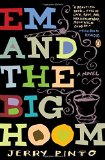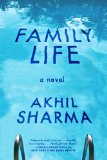Summary | Excerpt | Reviews | Beyond the book | Read-Alikes | Genres & Themes | Author Bio

Jerry Pinto's debut novel, Em and the Big Hoom, is the story of a Mumbai family trying to cope with their matriarch's bipolar disorder and the impact it has on those around her.
As the book opens we discover that Imelda Mendes ("Em") is, in her words, "mad," has attempted suicide for a third time, and the unnamed narrator, her teen son, is holding conversations with her, trying to take her back in time to discover when exactly her bipolar symptoms began to manifest themselves. Surely, he thinks, there must have been signs; there had to have been a trigger that caused her to begin acting out. He goes through her letters, asks for recollections from his older sister Susan and father Augustine (the eponymous Big Hoom, although no one remembers how he got this nickname), and talks to doctors. The son's search doesn't provide answers but along the way he develops an appreciation for the infuriating, eccentric, irreverent, tormented, glorious woman who is his mother; the book is ultimately a loving homage to a truly remarkable person.
Given the subject matter one would think this would be a grim, depressing tale, but Pinto injects just the right amount of humor into the narrative. Throughout, he uses conversations between mother and son to both illuminate their temperaments and to add a sense of lightness to the overall tone. The narrator asks Em why she refers to her husband as "LOS." She informs him it stands for "Limb of Satan" –
"Because he was always tempting me to sin," she said.
"Who was?"...
"Your father."
"It's not a sin if you're married, is it?"
"It's always a sin according to the Wholly Roaming Cat Licks."
"That can't be true."
"Can it not? I think you're only supposed to do it if you want babies. I wanted four but Hizzonner said, 'Then you pay for the other two.' That, as they say, was that. And I had to give the twenty-six others away."
Perhaps the major highlight of the novel is Pinto's ability to create truly wonderful characters. Em is one of the most unforgettable and richly painted women in literature I've come across; she's quirky and outlandish but in a completely believable way. She has a radiance about her – a vivacity – that is quite endearing. And yet during her depressive episodes she's capable of incredible cruelty to those who love her. At one point she tells her son that children "turn a good respectable woman into a mudd-dha. I didn't want to be a mudd-dha. I didn't want to be turned inside out. I didn't want to have my world shifted so that I was no longer the center of it…It never happens to men. They just sow the seed and hand out the cigars when you've pushed a football through your vadge. For the next hundred years of your life, you're stuck with being someone whose definition isn't even herself. You're now someone's mudd-dha!"
The narrator is the perfect picture of a confused, hurt, worried young man. His desire to find a reason for his mother's illness is partially based on his concern his birth may have been what initiated it. As he grows older and more accepting of his mother's problems, he also begins to worry that he or his sister may be prone to bipolar disorder, and he wonders if he will be vigilant enough to recognize if either of them start to slide into mental illness. Pinto records the narrator's voice so convincingly that one has a hard time believing the story isn't autobiographical; it comes across as exceptionally heartfelt and genuine.
Although the novel takes place in Mumbai, the setting plays very little role in the plot. This is a bit of a surprise given the stigma associated with mental illness in conservative countries like India. One would have expected there to be some mention of prejudice against Em because of her malady. But the story is told from the viewpoint of a young man, and at its core the novel is about his relationship with his mother and his personal reactions to her unpredictable presence in his life. Consequently the point of view is rather insular and self-absorbed; in very realistic fashion the teenager simply doesn't notice others' reactions.
Em and the Big Hoom is a slim little book that packs an enormous emotional wallop. This is one of those novels that will leave an impression on its readers and likely be remembered long after it's read. It will certainly resonate with those who have had experience with mental illness, and its universal theme of parent-child relationships will also strike a familiar cord with many readers.
![]() This review
first ran in the September 3, 2014
issue of BookBrowse Recommends.
This review
first ran in the September 3, 2014
issue of BookBrowse Recommends.

If you liked Em and the Big Hoom, try these:

by Miriam Toews
Published 2015
This is Toews at her finest: a story that is as much comedy as it is tragedy, a goodbye grin from the friend who taught you how to live.

by Akhil Sharma
Published 2015
Heart-wrenching and darkly funny, Family Life is a universal story of a boy torn between duty and his own survival.
Your guide toexceptional books
BookBrowse seeks out and recommends the best in contemporary fiction and nonfiction—books that not only engage and entertain but also deepen our understanding of ourselves and the world around us.